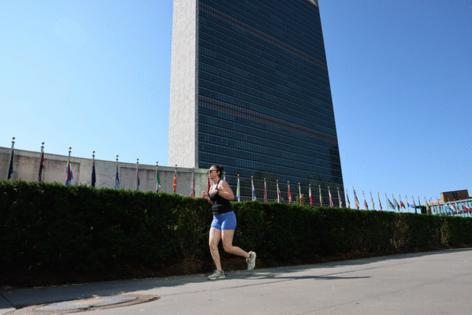UN agencies in dire straits amid threatened US funding cuts
Published in News & Features
If Congress this month approves the White House’s request to cancel $1 billion in federal funding for the United Nations system, experts say it will further exacerbate an already crisis-level financial shortfall for the global intergovernmental organization that the U.S. worked over decades to sustain.
The Trump administration included $1 billion in fiscal 2024 and fiscal 2025 funding spread across three different accounts in its $9.4 billion rescissions proposal that the Senate could take up next week.
The proposed cuts include funding for UNICEF, which supports children’s well-being, the World Health Organization, the U.N. regular budget and international peacekeeping missions in Lebanon and the Democratic Republic of Congo.
But even as the focus is on whether the Senate will clear the rescissions request before the clock runs out on midnight July 18, questions still loom over the fate of billions more in mandatory and voluntary contributions to U.N. agencies that the White House froze at the start of Trump’s second term.
Some funds previously allocated by Congress are at risk of expiring at the end of the fiscal year.
“The U.N. was already in a lot of financial difficulty before these U.S. cuts, but now the organization is just in a massive financial crisis, and it’s not just these cuts that are a source of concern,” said Richard Gowan, who oversees U.N. advocacy work for the nonprofit International Crisis Group. “There are big questions about whether the U.S. is going to pay its annual dues to the U.N. at any point this year. U.N. officials are working under the assumption that Washington might just withhold all money.”
The rescissions package includes cuts of nearly $202 million to an account that provides voluntary U.S. contributions to international agencies that handle a range of humanitarian, public health, education and women’s health activities such as UNICEF, the U.N. Office for Coordination of Humanitarian Affairs, which manages global responses to humanitarian disasters, and the U.N. Population Fund, which offers family planning and reproductive health services in more than 150 countries.
The White House said that $169 million of the proposed rescission to voluntary contributions for international organizations would “eliminate” fiscal 2025 funding to the World Health Organization, the U.N. Human Rights Council and the U.N. Relief and Works Agency for Palestine Refugees. Trump unilaterally withdrew from the WHO and the UNHRC in the first weeks of his second term. He also signed an executive order that continued a Biden administration funding freeze on the Palestinian refugee agency.
A separate proposed rescission of $437 million would cut all fiscal 2025 funds to UNICEF, the U.N. Development Program, which works to end poverty in roughly 170 countries, the U.N. Population Fund, and the Montreal Protocol, a well-regarded international climate treaty.
The White House is also proposing to cut $361.2 million from U.N. international peacekeeping operations and has said that at least some of that would eliminate contributions for the long-running U.N. peacekeeping mission in Lebanon that the Trump administration has accused of being an “abject failure” because of an inability to contain Hezbollah.
Senate appropriators previously grilled Office of Management and Budget Director Russ Vought over their concerns of the lack of specifics on what programs and country recipients would lose funding in the rescission package.
“It’s pretty customary in front of the Appropriations Committee with the director of the Office of Management and Budget, who is proposing to rescind dollars, for me to say, ‘Are you going to cut this, and if so, by how much?’ And I don’t think it’s actually a sufficient answer to say ‘We see unobligated balances, and we’ll either get back to you or not,” a visibly irritated Sen. Brian Schatz, D-Hawaii, told Vought at a June 25 Appropriations hearing.
Vought was coy in his response: “We’ve given you the extent to which the top line accounts are impacted, and the main story is the extent to which unobligated balances are flush.”
The U.S. funding pullback comes at a time when international organizations such as UNICEF say they are struggling to address conflicts and humanitarian crises in far-flung places such as Haiti, Myanmar, the Democratic Republic of Congo, Sudan and Ukraine.
“Severe budget cuts are undermining our ability to monitor, to prevent and to respond. . . . Mental health support is vanishing. Specialized, lifesaving care for survivors of sexual violence is becoming harder to access,” Sheema Sen Gupta, director of child protection for UNICEF, said in remarks to the U.N. Security Council in June.
Gupta noted that the U.N. has tabulated a 25 percent increase since 2023 in grave violations against children, including from killings, maimings, abductions and rapes.
The U.S. government has historically been the biggest contributor to UNICEF, which relies on voluntary contributions. In fiscal 2023, Washington donated nearly $1.1 billion to the fund, according to an annual report by the State Department to Congress on contributions to international organizations.
_____
©2025 CQ-Roll Call, Inc., All Rights Reserved. Visit cqrollcall.com. Distributed by Tribune Content Agency, LLC.







Comments